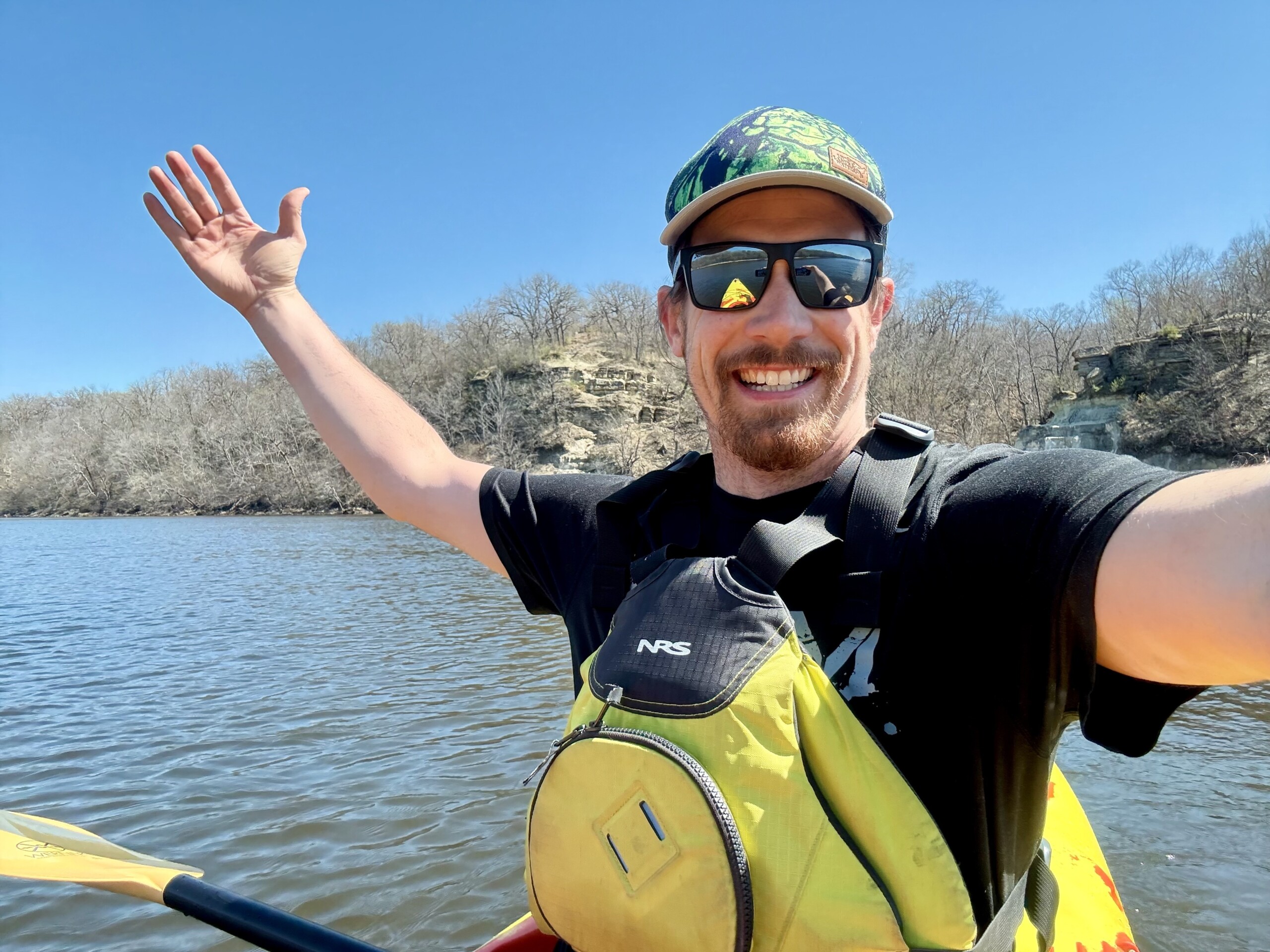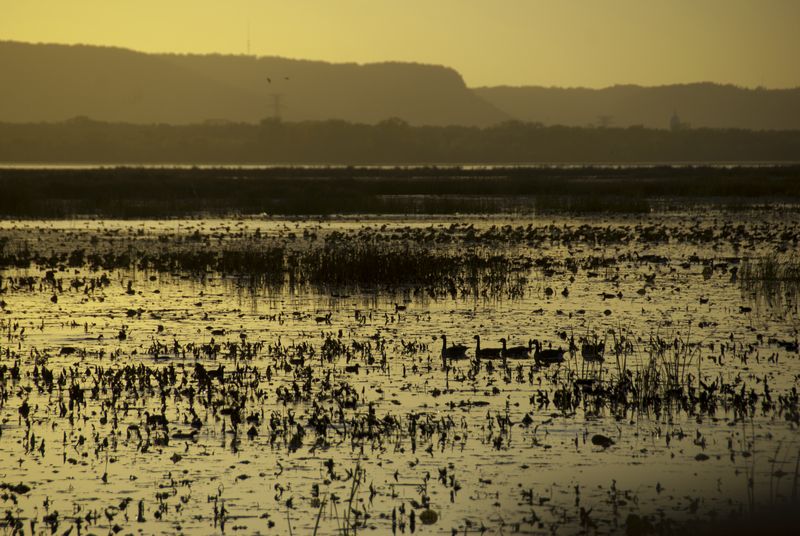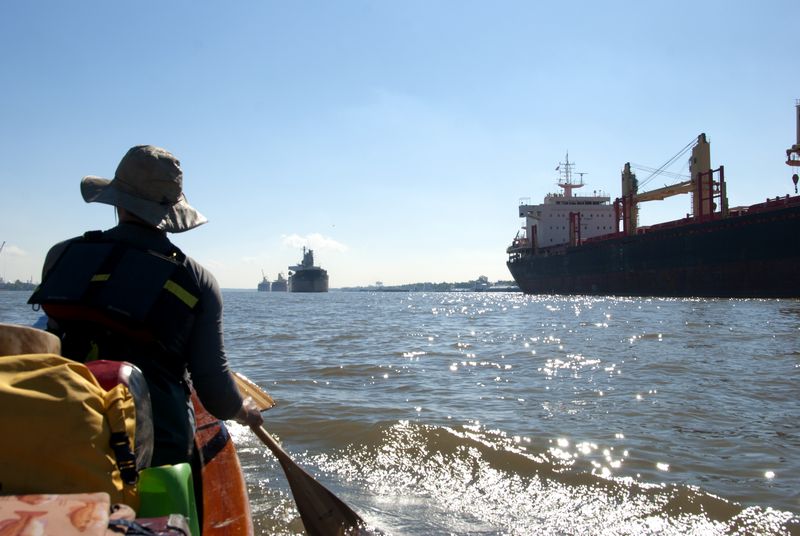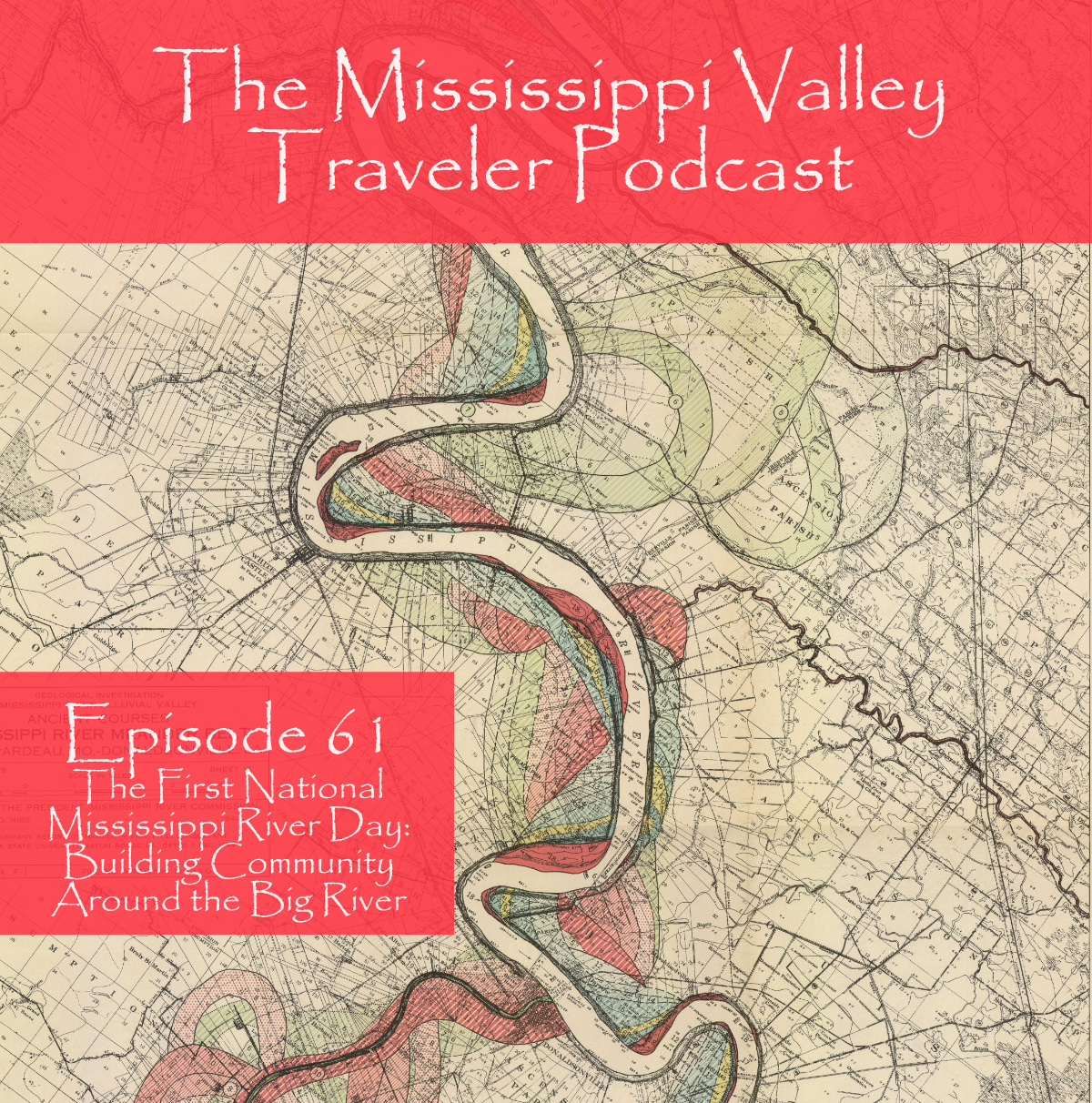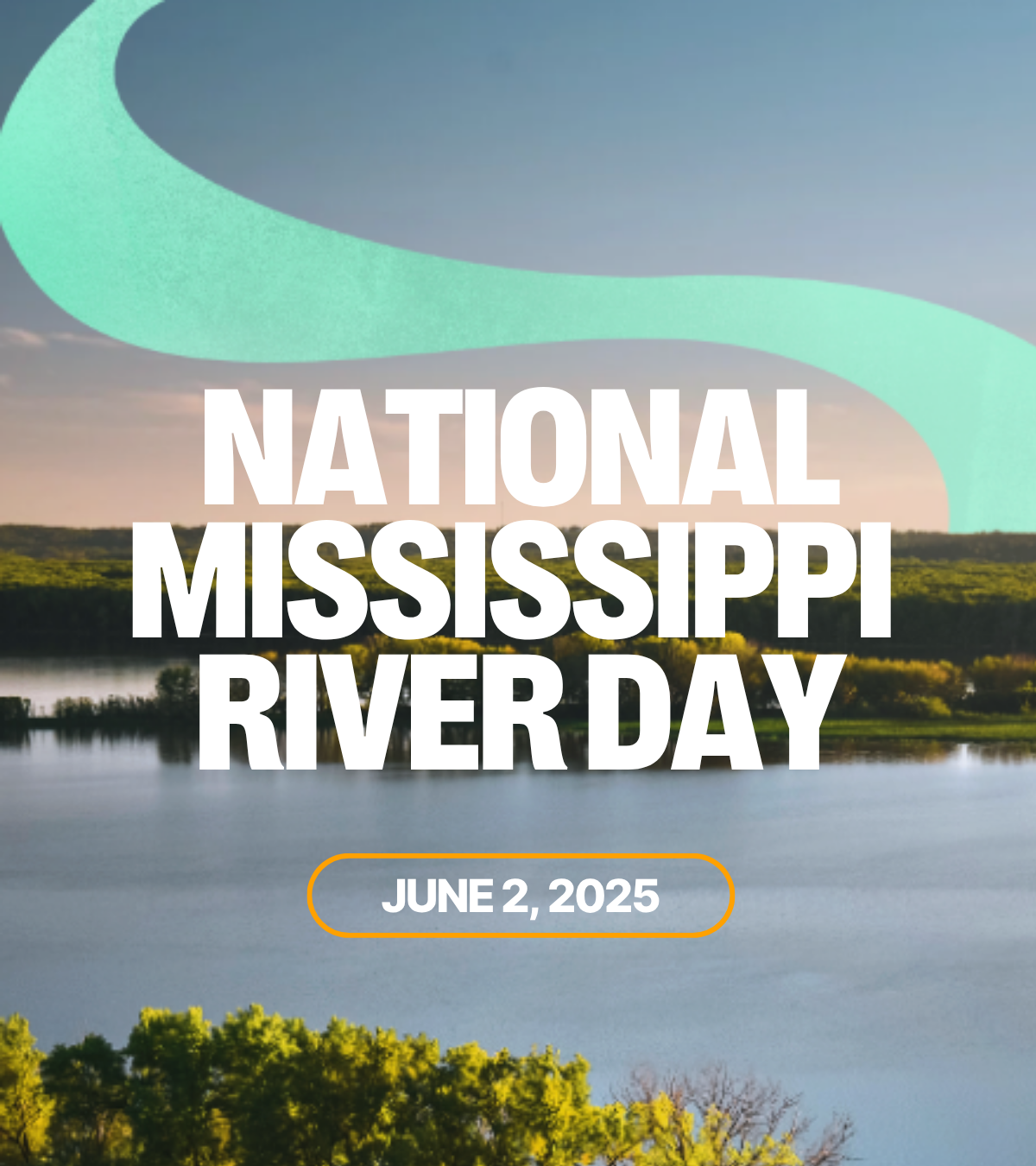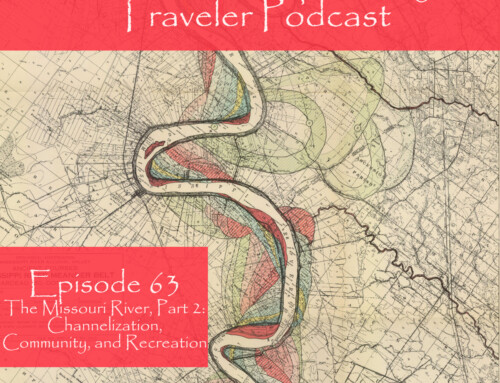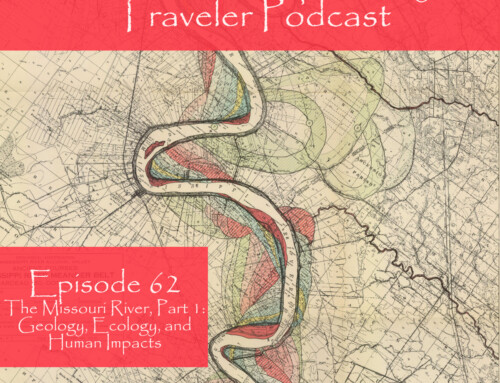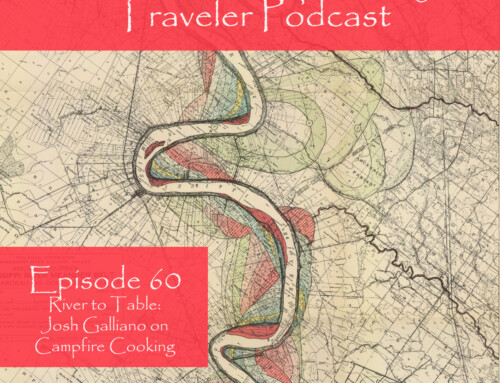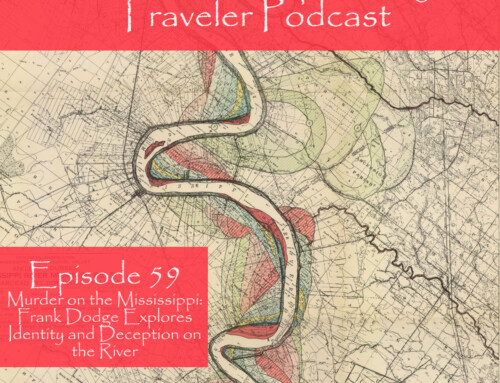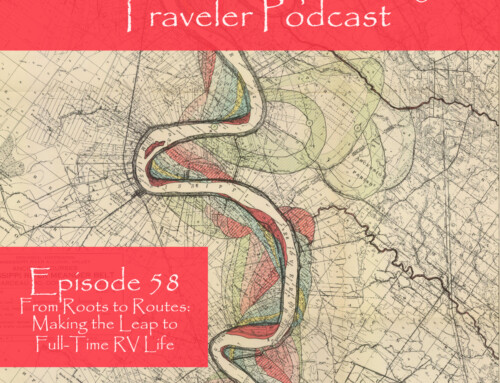February 1 is National Baked Alaska Day. April 14 is National Ex-Spouse Day, but April 22 marks Earth Day. We’ve had these (and more!) national days celebrating things silly and crucial, but we’ve never had a National Mississippi River Day. Until this year. It’s long overdue. On June 2, we’ll celebrate the first National Mississippi River Day. In this episode, I talk with Michael Anderson, the Director of Outreach and Education for One Mississippi, about it.
Michael begins by sharing a story about how the river lifted him out of a deep emotional hole and inspired him to help other people connect in their own ways to the Big River. He explains how his work at One Mississippi has helped grow a river-based community of 20,000 plus people who enjoy the Mississippi and take action to help protect it. He describes the varied ways people connect with the river and how any of us can find a way to build a new or deeper connection with the Mississippi, perhaps on the inaugural National Mississippi River Day. We talk about the events happening for National Mississippi River Day, as well as for the two following weeks known as River Days of Action. We finish with a few thoughts about what makes the Mississippi such a unique and special place.
In the Mississippi Minute, I offer a few thoughts about our work to protect the Mississippi and what we need to consider doing differently in the days and years ahead.
Show Notes
Support the Show
If you are enjoying the podcast, please consider showing your support by making a one-time contribution or by supporting as a regular contributor through Patreon. Every dollar you contribute makes it possible for me to continue sharing stories about America’s Greatest River.
Don’t want to deal with Patreon? No worries. You can show some love by buying me a coffee (which I drink a lot of!). Just click on the link below.
Transcript
Mon, May 26, 2025 2:26PM • 47:09
SUMMARY KEYWORDS
National Mississippi River Day, Michael Anderson, One Mississippi, river community, river days of action, Mississippi River, river restoration, river connection, river events, river network, river citizens, river health, river restoration program, river proclamations, river ecosystem.
SPEAKERS
Michael Anderson, Dean Klinkenberg
Michael Anderson 00:00
So I know many of your listeners probably already have a deep relationship with the Mighty Mississippi. And for those folks, keep going, keep connecting, like you were saying, Dean River Days is a great opportunity to even try out some new things, meet some new people. Maybe, maybe just get keep growing, trying new things. But in general, just invite everyone to connect with the river, right. Connect with water.
Dean Klinkenberg 00:47
Welcome to the Mississippi Valley Traveler podcast. I’m Dean Klinkenberg, and I’ve been exploring the deep history and rich culture of the people and places along America’s greatest river, the Mississippi, since 2007. Join me as I go deep into the characters and places along the river, and occasionally wander into other stories from the Midwest and other rivers. Read the episode show notes and get more information on the Mississippi at MississippiValleyTraveler.com. Let’s get going. Welcome to Episode 61, of the Mississippi Valley Traveler podcast. I’ve got a bonus episode I’m slipping in this week. We’ll have another new episode a week from now. Well, you may not know this, but February 1st is national Baked Alaska Day. April 14th is national Ex-Spouse Day. But just about a week later, April 22nd marks Earth Day. We’ve had these and many more national days celebrating things silly and crucial, but we’ve never had a National Mississippi River Day. Until this year. It’s long overdue. On June 2nd, we’ll celebrate the first National Mississippi River Day across the Mississippi River Basin. And in this episode, I talk with Michael Anderson, the Director of Outreach and Education for One Mississippi, about this year’s big event. Michael begins by sharing a story about how the river lifted him out of a deep emotional hole and inspired him to help other people connect to the river in their own ways. He explains how his work at One Mississippi has helped grow a river-based community of 20,000 plus people who enjoy the river and take action to protect it. We touch on the varied ways people connect with the river and how any of us can find a way to build a new or deeper connection with the Mississippi, perhaps on this inaugural National Mississippi River Day. We go into some detail about what exactly is going on for this first day, as well as events across the basin for the two week period known as River Days of Action. We wrap it up with a few thoughts about what makes the Mississippi such a special and unique place. So how are you going to mark the first National Mississippi River Day? Drop in a comment for this episode or send me a note. Thanks to those of you who continue to show me some love through Patreon, I’m deeply appreciative for your support. For as little as $1 a month, you can join the Patreon community, where you get early access to episodes. Patreon isn’t your thing. You can buy me a coffee. If you want to know how to do either one of these things, just go to Mississippi ValleyTraveler.com/podcast. You’ll find instructions for how to become a Patreon supporter, or just how to buy me a cup of coffee at that same URL, at that same location, MississippiValleyTraveler.com/podcast. You’ll find links to all 60 previous episodes along with the show notes for each of those episodes. Stick around after the interview. I’ve got just a few thoughts to offer about the river as we approach the first ever National Mississippi River Day. And now let’s hear from Michael. Michael Anderson is someone who truly lives and breathes the Mississippi River. He’s a lifelong student of the river, and he’ll tell you, the river literally saved his life back in 2010. Since then, he’s followed the call of one of his mentors, John Ruskey, offering his energy “As a worker bee in service to our queen the Mississippi.” Michael’s happy place is out in his canoe, and he has paddled more than 3000 miles across the watershed, removing over 7000 pounds of trash along the way. As a river guide and educator, he’s connected over 10,000 people with the river through work with the National Park Service, Wilderness Inquiry and others. One of the big things he’s learned there’s no cookie cutter way to care for the river. It’s about showing up, listening and meeting people where they are. These days. Michael is the Director of Outreach and Education for One Mississippi where he helps lead a community of 20,000 river citizens and coordinates the 75 plus member Mississippi River Network. He’s also behind River Days of Action happening June 1 through 15th, and is helping to launch the first ever National Mississippi River Day on June 2nd. Welcome to the podcast. Michael,
Michael Anderson 05:26
Thanks, Dean, happy to be here.
Dean Klinkenberg 05:29
We have so much to cover, like there’s so much meat to that intro as it is, that I just have to start by asking you, “How did the river save your life?”
Michael Anderson 05:38
Oh, Dean, that is that is a great, a great place to start, because really it is the foundation of why I get up every morning and do the work that I do. And so I was a student at the University of Minnesota, which is right on the banks of the Mississippi River. The short version of the story is this, I was very depressed, super, super depressed, and was looking for hope, and I happened to stumble into this Mindfulness Based Stress Reduction course, and they taught me about meditation and yoga and all these things that were very new to me, paying attention to my breath. So I stopped going to class Dean, because it was just slide after slide of ecological devastation at the hand of humans. And everything was terrible and bad. And I’m like this, this is pretty rough. I’m already feeling bad. So I started going down to the river, and at the river, I started practicing these breath techniques, this meditation, all of these good things. And as the ice melted on the Mississippi, the ice also melted in my mind and in my heart. And as spring settled on its banks, a awakening occurred in myself as well, and healing, I started becoming less depressed, and I tell you what, I absolutely continued to go to the river. And so that was 15 years ago, Dean, and that’s why I say the river, the river saved my life, right? Because I watched these the seasons changed. I watched how it changed me. And nowadays I just can’t I can’t leave it
Dean Klinkenberg 07:16
Amen. I hear you. I I’ve had similar experiences where time along the river had some healing, uh, effect on me. What do you think it is about the being next to the river that has that impact?
Michael Anderson 07:28
Really good question. I think it’s different things for different people, and even for me, in my life, it has looked differently and continues to evolve. Some things that stand out are, is the rhythm, right? So I already mentioned this sort of seasonal rhythm that happens with the Mississippi River, right? Living in Minnesota, we get the full effect of winter, spring, summer, fall, as very distinct seasons. But if you when I drop into that rhythm, I as a wild animal myself, right? I’m a human. I’m an animal. Find myself reconnect with these rhythms, and in particular, I find myself slowing down.
Dean Klinkenberg 08:13
Absolutely. One of the things I’ve been saying a little bit more regularly is we often hear people talk about how they have these innate fears when they’re outside, like when you hear the howl of a wolf, how you know your skin tingles, and maybe the back of you, the hair on your back rises a little bit. I think there is something to that those innate fears, but I think the opposite has to be true as well, that we feel this innate sense of peace or connectivity when we’re out outside as well. And we evolved with the with that world over generations for 1000s and 1000s of years. So so it makes sense. It’s got to cut both ways, right?
Michael Anderson 08:49
Yeah Dean, I couldn’t agree more. And I was talking with a friend probably about six years ago, when I was really starting to get deep into my role with One Mississippi, which I know we’ll talk about later, I was talking to my friend Ben Weaver, and we’re down at the river, and I’m just like, Ben, how do we know what the river needs? And he kind of looked at me like I was from a different planet. And he just simply said, “Brother, you’re an animal. You’re a part of this. You’re connected. Sense into it. Feel into it. If you’re good, the river is good. If the river is good, you’re good.” It never left me
Dean Klinkenberg 09:32
Very good. All right, so you mentioned One Mississippi, and that’s you work for One Mississippi, have for a little while now. So what the heck is One Mississippi?
Michael Anderson 09:42
Thanks, Dean. Well, one Mississippi, yeah, I’ve been here six and a half years now. One Mississippi is the premier steward and voice for the people, land, water and wildlife of America’s most iconic waterway, the Mighty Mississippi River. As the leading force in forming coalitions between community. Communities, organizations and businesses committed to protecting the future of the Mighty Miss we celebrate and lead programs that foster individual and collective action. And so in my role as as you read off in the intro, I’m thrilled to share that since 2005 so this is our 20th year, One Mississippi has grown a community of over 20,000 river citizens, and these are just everyday people that want to learn more about the river, want to connect with the river, want to take action on it, on its behalf. So I oversee or I coordinate that community by providing events, action opportunities, educational information and other ways to connect with the river, and how we often do that best is by sharing opportunities from our Mississippi River Network member organizations. And like you said, we have 75 of those. Dean yourself as the Mississippi Valley Traveler, I think you’ve been around since, since day one. And so by by working with these organizations, with people on the ground and other target audiences, together, we’re creating a healthier, healthier and more resilient Mississippi River now and for future generations.
Dean Klinkenberg 11:10
Well, one of the new things that’s part of your mission now is really sort of spreading the word and coordinating this day, the National Mississippi River Day. Why does the river need its own day?
Michael Anderson 11:23
Yeah, Dean, I couldn’t be more excited about this idea. So let me just back up a step, a step here. So June 2nd, it’s official. June 2nd from from starting this year here on out, is officially National Mississippi River Day. Okay? And we cooked up this idea within the Mississippi River Network, and we really believe that a this is long overdue, right, that the river America, like I said, America’s most iconic waterway, right? The river of our imaginations, the river of our culture, the Mississippi deserves more than just being thought of as like a transportation highway. It’s so much more than that, and so we really believe by establishing a day like this, a dedicated day, we can raise the profile of the river, which means just making it more known and more accessible for people to connect with and build a relationship with. Dean. I know you’re in St. Louis and I’m in Minneapolis, and I think you know, for a lot of folks, there’s sort of relationship with the river is when they’re going past it in their cars, maybe 70 miles per hour on a highway, you know? And so by having a dedicated day, and it’s followed by two weeks of action and events. That’s River Days of Action. We’ll talk more about that. We really believe this is an incredible opportunity to raise the profile of the river and connect more people with it.
Dean Klinkenberg 12:53
So you’ve been doing this for a little while yourself, maybe not since day one, and maybe for me, maybe I’ve been there since day three, you know, maybe not day one, but for a little while. So what have you seen about the different ways people connect to the Mississippi? And there’s not just one way to do this. What can you describe a little bit of the variety you’ve witnessed for the way people express connection to the river?
Michael Anderson 13:15
Absolutely, absolutely and let me share how I what informs what I’m going to what I’m going to say. And this, this includes bringing out like, like you said in the intro, 10,000 people out on the river. This includes paddling solo down the Mississippi from the headwaters in Minnesota all the way down to Louisiana. And I bear witness. I watch, I listen. I see all these different ways. You know, I was out last weekend on the Mississippi right here in the Twin Cities. People were down there with their dogs, connecting with the river and each other. People were down there having fires. People were down there painting and making other art. People were down there recreating, throwing footballs and Frisbees. People are down there meditating. People were driving by on the bridge. People were walking by, people I’m sure near nearby, were calling on its behalf, right, calling their elected officials with different advocacy alerts. And it just keeps going, right? I could literally sit here. I won’t do it for the benefit of your viewer, and keeping this podcast tight and the timeline, I won’t just list all the ways, but we could spend 30 minutes, Dean, I know you and me just lift listing off different ways that people connect with the river, and that’s because it is so rooted in our culture, right? And I’d be remiss, of course, to not mention the long history that indigenous peoples of this place have with the river right as a place of deep spiritual connection, of sustenance, of travel, all of these things still continue today in different ways. People are connected with the river, for sure.
Dean Klinkenberg 14:55
Yeah, you and I both have had the good fortune of being around people and witnessing the different ways they connect. And I was just thinking like, even this, like the river is so deeply embedded in our cultural DNA. This year, the “James” by Percival Everett won a Pulitzer Prize. And it’s, it’s a riff on the on Huck Finn, you know, Mark Twain’s Huck Finn So, this, and that’s a story that was 150 some years ago that book was released. So these cultural images, the the centrality of the Mississippi to our cultural world. It’s so continuous, that thread just, you know, spans across generations in time, from Native Americans to today. So maybe even, like, if people can’t get near the Mississippi, maybe if they’re out in California, or if they’re in Germany or some other place, maybe they could pick up a book about the Mississippi and read a little bit, or get together with some friends and share a toast to the Mississippi. I mean, there are lots of different ways to express that connection, right?
Michael Anderson 16:02
Dean, I couldn’t agree more, and I would also have to recommend for folks, I’m sure many of your listeners have, but be also, be sure to check out the Mississippi Valley Travelers books, because, yeah, Dean, you yourself have plenty of great literature out there for people to learn more and also develop that connection, right? This can happen to your point, and establishing this National Mississippi River Day this year in 2025 actually couldn’t be better. And I say that because we are in a time of great division right across our across our across our nation, across the world, in particular on home, home soil here, there’s a lot of different politics and a lot of different ways that people are living, even along the main stem states, so from Minnesota to Louisiana. But here’s the thing, it’s common water. We’re all connected by the river, right? We all need that’s 20 million people that are getting their drinking water from the Mississippi. Okay? 60% of North American birds use this river as their migratory flyway. I could go on and on with the facts and figures, but the point is, the river connects us all right, and so I firmly believe, in a time of great division, where are those opportunities to connect? And I, like I said, I firmly believe that the Mississippi River is one of those things. As I mentioned, this day is starting in 2025 but we’re not stopping there. This is going to be an annual thing, year after year. And so, you know, you just made a great reference, kind of some historical context. The other side of that is, where are we going. You know, where are we going? And so having this anchor, this annual day dedicated to the Mississippi River, will be a touchstone in which we can build, not just in terms of protecting the river, but in terms of connecting our communities all along it.
Dean Klinkenberg 18:01
So what are your hopes for this first year? Obviously, like you know, Earth Day has had 50 years to build a following and generate all the attention it does. I’m sure the first year wasn’t anything like the 50th year. What are your hopes? How is One Mississippi marking the very first National Mississippi River Day?
Michael Anderson 18:17
Dean, thank you so much. So we have a event happening on June 2. Just, let me say this again, June 2nd is National Mississippi River Day, so we have an online event to cut to celebrate this day and really give an update to our our river citizens, our network members, members of the press and beyond. Everyone’s invited to hear about this effort. And one way that we are making this, you know, quote, unquote, official, is that we are reaching out to city, state and even federal at the federal level for proclamations and resolution. And I am thrilled to share we had a goal of this year. This is the inaugural year. We had a goal of one city will make a proclamation, and Dean as of this morning, we have 10 already. 10 proclamations are happening at different cities and towns up and down the river. I literally just before this podcast, saw an update from one of our partners at Audubon that they have a meeting set with a senator in Mississippi to really talk about this at the congressional level, to get this proclamation done this year. So that is one way that we were making this official and tying it together from headwaters to gulf. And if it’s all right, I’d love to just read the synopsis of this proclamation, and we could put the full thing into your show notes for your for your listener.
Dean Klinkenberg 19:43
Please go ahead.
Michael Anderson 19:44
Alright, I’d invite everyone to close their eyes. The Mississippi River is at the heart of our nation’s history, culture and economy, shaping the communities along its banks and connecting people across its vast watershed, from the wild rice beds at the Mississippi’s headwaters in Minnesota to the oyster reefs at the Mississippi’s mouth in Louisiana. The river sustains millions of people, provides critical habitat for diverse wildlife, and is a vital artery for commerce and recreation. There’s about eight whereas clause that follow this as as the standard for proclamations that get more into the details of some of the issues, but also some of the opportunities and the solutions. And so we’re just thrilled. Like I said, we already have 10 cities that have made this proclamation at their city hall or will on June 2, and it’s has all the signs, Dean, that this will just catch like wildfire for the years ahead. So we couldn’t be more thrilled with the inaugural year.
Dean Klinkenberg 20:52
Hey, Dean Klinkenberg here, interrupting myself. Just wanted to remind you that if you’d like to know more about the Mississippi River. Check out my books. I write the Mississippi Valley Traveler guide books for people who want to get to know the Mississippi better. I also write the Frank Dodge mystery series that is set in places along the Mississippi. My newest book, ‘The Wild Mississippi,’ goes deep into the world of Old Man River learn about the varied and complex ecosystem supported by the Mississippi, the plant and animal life that depends on them. And where you can go to experience it all. Find any of these wherever books are sold. Well, that’s great that you’ve got 10 cities already on board with proclamations, and over time, I’m sure that will become the majority, if not all, the cities along the Mississippi will want to be a part of this. So let’s just take a moment and kind of take stock of where we’re at with the Mississippi. You mentioned. You know the importance of the fly away. 60% of migratory birds rely on the Mississippi to go between their to fly in spring and fall. What is it, 300 some species of fish. 325, something like that species of fish rely on the Mississippi. Tell us some of the things about the Mississippi that make it so outstanding.
Michael Anderson 22:15
Wow. That is, that is a great question. And people have written books about this, of course. So you know, I’ll speak for myself, Dean, I when I, like I said, I I’ve canoed the the whole river. I didn’t quite make it to the Gulf, but that’s a story for a different time. And part of what really stood out to me was how majestic this river is, and really how wild it is. You know, we have, we have engineered it in such a way to control it as best as we possibly can, to aid, you know, the barges and navigation through a series of these 29 locks and dams. You know, from Minneapolis to St. Louis, couple more dams in the Headwaters region as well. And it, and it still maintains its wildness. And then you get on the lower river, and there are, what, 100, 100 mile plus stretches where you don’t see any towns, you’re just out there. And so it’s really, you know, for the sort of American imagination of frontier and wilderness that still exists, that’s the Mississippi River, right? And so a big thing we advocate for is the reconnection of floodplains with the river, and the restoration of wetlands. And all of this just add even more space for this river, to to to be itself. And part of what I mean by that is space to flood, right? And these wetlands and this and the floodplain help slow and store water during times of flood in times of drought. So anyways, for me, paddling down really opened my eyes to the wildness of the river, as well as what we talked about earlier, all the different ways in which communities and individuals have a relationship with the river. And here’s the fun thing about this, Dean, I talk about the Mississippi every day. The Mississippi really is just the culmination of all of its tributary rivers, okay? And if you ever I invite everyone to look at a map of this. It looks like an upside down tree, right in the sense that it has, if you look at the main stem of the river, kind of the trunk, it has all of these branches that spread all the way to the Rocky Mountains in the West to Appalachia in the East. And to really get to know it, you can also explore these tributary it’s all part of it. So kind of on this idea, you don’t need to live in a Mississippi River City in town to connect with the river. And all these tributaries are connected. And I would even argue, because it’s all about water and wildlife and people, we’re all connected because.
Dean Klinkenberg 25:01
Absolutely, well, that does that fantastic way of describing, you know, the value and importance of this river. Are there particular challenges right now? I mean, there are always things that we can can focus on that need to be better or need to be fixed. But at the moment, are there particular challenges that weigh more heavily on our minds, or should weigh more heavily on our minds?
Michael Anderson 25:23
Absolutely. Two, two immediately come to mind. The first one I’ll just mention again that is extreme flooding and extreme drought, and we are seeing this dang near every year somewhere in the Mississippi River watershed, right? So that’s an ongoing issue. I already shared a couple of those solutions, like reconnecting floodplain or restoring wetlands. Other solutions include what we are land use practices, and in particular, with agriculture, right? So there’s a lot of different practices that we can do in field that improve soil quality and also improve water quality while supporting the bottom line for farms. So there’s that’s, that’s so this whole extreme flooding and drought is just a major, major issue. Right now, see, you know, seated in 2025 a big issue is the future of major programs on the Mississippi in particular programs that are supported at the federal level and often are done in collaboration with states and local entities and communities. So for example, the Upper Mississippi River Restoration Program is a program at risk, at great risk right now, on our Mighty Mississippi. And just for folks that don’t know, I’ll briefly share that this program has two aspects to it. The first one is the science. It’s this long term resource monitoring, they call it and in fact, the data sets that are that have been produced from this program are some of the longest running and largest data sets in the entire world on how to best manage and care for big rivers. Right? It’s very focused on big river ecology, water quality and beyond, right? So it’s almost 40 years of this continuous data that’s at risk. It’s continuity is at risk because of funding cuts from the federal government. The other side of this program is the restoration that it does, and so this, a lot of the science monitoring does inform what needs to be done, and they call it habitat rehabilitation enhancement, right? So what things need to be done in terms of restoration to help improve the river’s form and function? And so anyways, this, I could go on and on about that specifics. I’m deeply involved in this program, and as is One Mississippi we’re, you know, huge proponents of this, this program, which runs from pretty much the entire upper Mississippi River, as well as, like the Illinois in parts as well. So this is a big deal, and and we are still, we are in in the thick of understanding what the loss is going to be, potentially in terms of budget cuts for the program, which are going to have just really severe rippling impacts.
Dean Klinkenberg 28:34
Yeah, well, all the more reason to have a day focusing on the river to remind people about why the river is so important.
Michael Anderson 28:44
So Dean, that’s That’s right, that’s right. And people care, right? Whether it’s whether it’s getting connected with this National Mississippi River Day or supporting things like the Upper Mississippi River Restoration Program, I do just want to share an example of how how people care and are making a difference. When we found out there was proposed budget cuts to this program, we put out an action alert. That’s something our organization does. We provide easy ways for people to speak up to their elected officials, as an example, to Congress, and make a difference that way. Dean, this was the fastest to 1000 plus actions that we’ve ever had. So in five days, 1060 people sent over 3000 emails to Congress. This action alert was shared 500 times on social media, garnering nearly 75,000 views. What a clear outpouring of support from the community right? One Mississippi barely did anything. We just created this opportunity, and the community got behind it and shared it and took action. So I tell you what it’s, it’s, it’s really clear that people care. About the river that people want to learn more. And so something like National Mississippi River Day is just so dang excited of thinking of how we can all really come together.
Dean Klinkenberg 30:09
Absolutely that. Yeah, that’s a great indication of the passion so many people have for the river to have that kind of response, especially if somebody those alerts people will ignore and not pay any attention to and obviously that was not the case at all for this one. People understand the threat. Now you have something going on a zoom conference, or something going on on the 2nd itself. To you want to say something about that.
Michael Anderson 30:35
We do. Yeah, I would love to. So June 2nd, inviting everyone to be a part of this historic moment for the Mississippi River. So on Monday, June 2, at 12pm Central, we’re hosting a mighty day for our mighty river. This is an online celebration marking the first ever National Mississippi River Day. So invite everyone join us in community as we grow this, this movement to establish national, National Mississippi River Day. Hear from one Mississippi staff and leaders within the Mississippi River Network about the progress we’re making. Already mentioned some of those, the Proclamations, and find out how you as an individual can help make waves of impact for many years to come.
Dean Klinkenberg 31:21
Alright, I will post a link to that in the show notes. So if folks are interested in signing up for that Zoom chat, that Zoom kickoff, they can just go to MississippiValleyTraveler.com/podcast, to this episode number 61 and they can click on the link there to sign up for it now the June 2nd National Mississippi River Day is only one thing going on. You’ve also got this whole River Days of Action thing. So tell us about that.
Michael Anderson 31:50
That’s right. Dean, yeah. So we’re back for our fifth annual River Days of Action happening June 1 through June 15. And this is all about providing events and different opportunities for people to make a difference, right? So I’ve kind of waxed and waned quite a bit about this Mississippi River Network, 75 organizations, from Headwaters to Gulf, working together. Like that’s just so immense. And with River Days, these organizations submit different events that are often happening locally. Some happen online, and so it just provides a waterfall of different events for people to get connected locally, and like I said, online as well. In addition, let’s say there’s not an event by you, we still have you covered. You can still get involved. Anyone can get involved and make a difference. If you go to MississippiRiver.org/river-days-of-action, we’ll make sure this link gets in the show notes as well. You can find the full list of events, but then you can also receive a download of our 10 actions to create healthier Mississippi River. Okay, so we’re really calling on everyone June 1 through June 15, attend an event if you’re able, and take action, right? Get this, get this, get this list, and you’ll be surprised. They’re they’re really full of seemingly simple but meaningful ways that we can make a difference together. So that’s right, Dean June 2 sort of kicks it off. It’s going to be a big magnet that will bring people to the river. But then want people to really understand that this is then followed by two weeks of opportunities.
Dean Klinkenberg 33:38
So I know I need to go back and check that schedule to find out what’s going on in my area. Is there something up in the Twin Cities you’re looking forward to participating in during River Days of Action yourself, or taking maybe something you can take the kids to?
Michael Anderson 33:51
Yes, that’s right. Thanks, Dean. Yeah, there’s a number. So one of our network members here locally in the Twin Cities, Friends of the Mississippi River. Shout out to them. They have a, I think, three or even more restoration events happening in the Twin Cities, so things like pulling garlic mustard as well as some tree plantings, those are going on. And these are, I’ll mention these as examples in the Twin Cities, but it’s very similar things up and down the river. Other examples, there are some kayak you can do a kayak course, I know, also in St. Louis, the Mississippi River Water Trail Association is is scheming that event as well to get people out on the river. There’s a big it’s called the Minnesota paddling opener happening, which is a full of tours, races and relays for canoeing, kayak, stand up paddle boarding happening on the river. There’s cleanup and cleanup events happening at the waterfront. Many groups are hosting those up and down the river, and there’s a few online events as well. I’ve already mentioned the June 2nd one, another online event that is likely is happening June 12, I believe, hosted by the Audubon Society and the Tulane Institute. And they’re really focusing on sharing about Lower Mississippi River issues and opportunities, things that are happening in Louisiana. So I’ll leave it there, and definitely invite everyone to check out the calendar, because it’s full. And there’s, you know, and there’s, there’s cool things that one I want to go to in Minnesota I’m probably going to miss it is a Dakota Plant Walk with a native woman who is is is sharing about, you know her, her history is deeply rooted to the lands and waters in this area, and sharing about the different plants as they relate to Dakota culture as part of a like a plant walk. So, yeah, really, really cool things happening.
Dean Klinkenberg 35:57
So go to onemississippi.org/riverdaysoaction. Or is that the right? Did I get that right?
Michael Anderson 36:05
MississippiRiver.org/river-days-of-action. Yeah. Our new, our new website, officially, is MississippiRiver.org Yeah, the One Mississippi that will redirect to MIssissipiRiver.org.
Dean Klinkenberg 36:18
All right, yeah, one of the things that I like about this part the whole couple of weeks is a great opportunity to connect with people, maybe a whole bunch of people you’ve never had the chance to meet before, people who share that same interest and passion for the river along much of the Mississippi. It’s a great time of year to be out there before the summer heat really kicks in. Probably not so much if you’re down in Mississippi or Louisiana, but you’re used to it down there. So yeah, I think it’s just it’s great to go check that calendar, see what’s going on, find something to participate in, and then try to figure out a way to help us mark that National Mississippi River Day on June 2.
Michael Anderson 37:00
Amazing.
Dean Klinkenberg 37:01
Is there any final words Michael? Anything else you’d like to say about the day or the River Days of Action?
Michael Anderson 37:09
Let’s zoom all the way out and just talk about the river. And just a general, I know many of your listeners, probably already have a deep relationship with the Mighty Mississippi. And for those folks, keep going, keep connecting. Like you were saying, Dean River Days is a great opportunity to even try out some new things, meet some new people. Maybe maybe just get keep growing, trying new things. But in general, just invite everyone to connect with the river right, connect with water. I’ll share a personal story that we do at home. So I’m one of the 20, my family we’re a part of the 20 million people that get their drinking water from the Mississippi. Excuse me. And so, of course, I have young kids, as you mentioned earlier, and so you know, when we ever were brushing our teeth, Dean, when we take a bath, when we wash dishes, my kids, who are three and two, they already know that that water is from the Mississippi, right? That’s such a fundamental thing that we can all understand about where our water comes from, right? And then I’ve learned from some of my mentors that you can, you can thank the water. You can talk to the water. You can that’s another way you can build a relationship. As I already shared earlier, the river saved my life, right? It’s a very, very deep, often spiritual relationship that I have with the Mississippi and it and it defies just the water flowing through the banks. Right? The river is so much more than that. And we’ve, I think, hit on a number of different points in our conversation today about how people can connect with the river, and that’s what I’ll leave everyone with. Find your way, find your way to the river, find your way to water. And after you’ve already found it, then find another way, right, be like that river holding all the tributaries, all of it coming together. And so from there, I think we can really restore some of our connection as people with things like, like, like Mississippi.
Dean Klinkenberg 39:24
Very well said. Michael, deeply appreciate it. Thank you for for sharing some time with us today, and hopefully we’ll see you out on the river sometime in the near future, maybe in that week of River Days of Action even. So, or those couple weeks. So good luck and see you on the river.
Michael Anderson 39:43
Awesome. We’ll see you out there. Dean, thank you.
Dean Klinkenberg 39:54
And now it’s time for the Mississippi Minute. One purpose of. Of commemorations like June 2 National Mississippi River days to reflect on the importance of this star of the day. So let’s reflect for a minute. There’s no other river in the United States as revered as the Mississippi. The river sustains a natural world unlike any other in North America, providing critical habitat for a mind boggling range of plant and animal life. There is no other river in the United States with 1000s of years of cultural significance like the Mississippi, from indigenous people who relied on the river for life to flat boatmen who made their living off the river to musicians who wrote songs inspired by the river. There is no other river in the United States that moved people and goods as long or as famously as the Mississippi, whether it’s indigenous people trading for copper or stone to trappers moving furs to barges carrying corn destined to feed livestock in China. There’s no other river in the United States that cuts through as much human history as the Mississippi, from mound builders to sod busters to audacious engineers, and today, a lot of people value the river as a place to paddle or to escape into the natural world for a respite. These are just a few of the ways the Mississippi has mattered to us across time. We fared poorly managing the big river for all of these uses of the Mississippi, giving priority to certain easily counted economic activities. So maybe we could also argue that there’s no other river in the United States as mistreated as the Mississippi. 20 years ago, Cal Fremling, the esteemed biologist who spent his career studying the river at Winona State University, published “Immortal River”, one of a handful of books that has influenced my thinking about the river the most. He summarized the state of the river at that time, this way – “The Upper Mississippi River is a threatened ecosystem because of what humans have done within it. Man’s navigation and flood control structures have locked the Mississippi’s main channel in place, arresting natural geologic processes. As a result, biologic diversity and abundance are declining, and natural communities continue to simplify. Aquatic habitats are being lost to sedimentation, the quality and integrity of riverine resources have been degraded, and public trust and technical experts has withered, as has trust in the Corps of Engineers.” Yeah, he wrote that 20 years ago, and frankly, not that much has changed. It’s easy to be negative right now, to feel discouraged, especially as the current administration moves to eliminate the Upper Mississippi River Restoration Program, a modest effort to repair some of the damage we’ve done to the Mississippi in order to make it navigable for barges. In its 35 years, the program has restored or improved some 110,000 acres of habitat along the Mississippi River. It’s funded an unparalleled long term monitoring effort as well, and it’s done that with an annual budget around, or slightly above, $100 million. That’s a fraction of the billions of dollars of public money we spend every year to keep barges moving. Losing the Upper Mississippi River Restoration program would hurt and nearly inspired a much angrier editorial from me. I don’t think we really need more anger right now, though, but we certainly do need to reflect. We’ve lost momentum for environmentally friendly policies it seems. We live at a time when information is fragmented, when many people have lost faith in institutions when a lot of us are skeptical of top down solutions coming from the federal government. These are just facts of life right now. But how have we adapted to this changing world, for those of us working in the environmental world? Are we adept at meeting people where they’re at, communicating in media we’ve typically ignored or avoided? Can we develop messages that resonate with people without using words that carry heavy partisan baggage? Last month, the Mississippi River Ag & Water Desk ran a series of articles about wetlands, and one of those pieces Scott Glup, sorry if I mispronouncing that, the retired project leader of the Litchfield Wetland Management District for the Fish and Wildlife Service, offered a different definition of productivity. When he was asked how he responded to criticism that restoring wetlands was taking land out of production, he said, “We’re not taking it out of production. We’re putting it back into production with these wetlands, we’re producing groundwater recharge, erosion control, flood protections, ducks and pheasants. We’re producing public land that people can go out and enjoy. We’re producing pollinators.” I love that response. It’s a good message, and one that doesn’t lean into preaching to the choir. I follow a lot of groups engaged in environmental work, and I see a lot of messaging that resonates well with people on the political left, but that would be almost immediately dismissed by people with more conservative political beliefs. We can’t afford to cater to only part of the American population. We know there is widespread support for policies that protect and rebuild habitats. We know strong majorities of the American population value outdoor recreation or just having natural places to visit. We also know we’ve lost some support because of messaging from conservatives that amplify excesses or overreaches in environmental policy or just outright lie about them. We can’t ignore them or these stories they tell, though, we need to counter with stories of our own that resonate with a wider range of people. National Mississippi River Day is something we can rally around to get more people to the river to see it for themselves and learn new stories, and to challenge ourselves to reflect on the stories we tell about the Mississippi and how well they’re helping us save the great river from ourselves. Thanks for listening. If you enjoyed this episode, subscribe to the series on your favorite podcast app so you don’t miss out on future episodes. I offer the podcast for free, but when you support the show with a few bucks through Patreon to help keep the program going, just go to patreon.com/deanklinkenberg. If you want to know more about the Mississippi River, check out my books. I write the Mississippi Valley Traveler guide books for people who want to get to know the Mississippi better. I also write the Frank Dodge mystery series that’s set in places along the river. Find them wherever books are sold. The Mississippi Valley Traveler podcast is written and produced by me, Dean Klinkenberg. Original Music by Noah Fence. See you next time.
